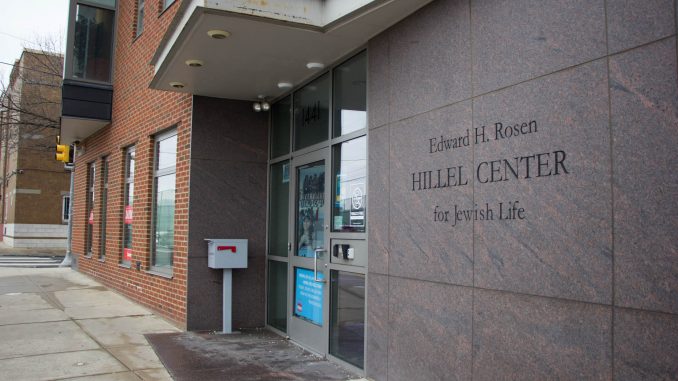
In middle school, Hannah Rose Roach had pennies thrown at her by classmates for being Jewish.
Two days after former President Donald Trump was elected during her senior year at Mount Holyoke College in South Hadley, Massachusetts, someone defaced Mount Tom, a local attraction, with swastikas and anti-Semitic slurs.
“A lot of people were up there scrubbing in a way, and helping take down some of the graffiti,” said Roach, a second-year medical student and former co-president of the Jewish Student Union. “So that was really inspiring, but it was also really exhausting to go there and see all those things.”
With attention to hateful or targeted political discourse in recent years, some Temple University students and faculty are worried about the rise in anti-Semitism in politics.
Anti-Semitism has been and continues to be a pervasive force in American politics and can be both overt and covert, said Lila Corwin Berman, a history professor and director of the Feinstein Center for American Jewish History.
Overt anti-Semitism can be anything that is openly against Jewish people or Judaism, including negative comments about someone’s Jewish identity, said Carly Goldberg, a senior communication studies major and former co-president of Hillel’s Tzedek Board, which oversees community service efforts.
Hate crimes against Jewish people increased nationwide by 14 percent in 2019, according to data from the Federal Bureau of Intelligence, Jewish Telegraphic Agency reported.
Reported anti-Semitic incidents in Philadelphia increased from 33 in 2018 to 52 in 2019, according to the Anti-Defamation League, a national civil liberties group.
There is often debate, even among Jewish people, about what leads to violent anti-Semitism, with some of the Jewish community blaming political rhetoric and others focusing on extremist branches of Christianity, Berman said.
Covert anti-Semitism often relies on “historical tropes,” like Jewish people being “puppet masters” who are secretly running the world, Berman said.
Conspiracy theories about investor and philanthropist George Soros play into the larger conspiracy that Jewish people secretly control the world and are destroying society as revenge on Christians and are a popular version of this, Berman said.
“If you walked in from Mars, you might not think that someone saying ‘puppet masters’ has anything to do with Jews,” Berman said. “But it might be in a particular white nationalist, ethnonationlist community, like the Proud Boys, that language is clearly about Jews.”
During his first presidential campaign in 2016, Trump regularly retweeted neo-Nazi memes and used coded language to spread conspiracy theories about Jewish people, the Washington Post reported that year.
In October 2020, the Pennsylvania Republican Party sent a mailer that featured an image of State Rep. Jennifer O’Mara speaking at a Democratic Jewish Outreach Pennsylvania event with a stylized Star of David in the background of the photo, the Delaware County Daily Times reported.
Incidents like the one involving O’Mara are “unacceptable” and disturbing as they “correlate corruption and Judaism,” Goldberg said.
Covert anti-Semitism can also take the form of caricatures that use features commonly associated with Jewish people, like hooked noses, or memes about Jewish celebrities like Mark Zuckerberg being a “lizard person,” Roach said.
“The world is built, kind of built around anti-Semitism in many ways,” Roach said. “The idea of like, the witch and how a witch looks is rooted in anti-Semitism and so from like, the first Disney movie you watch you see a Jewish-coded character be evil.”
Although she’s experienced instances of overt anti-Semitism, it’s this subtle anti-Semitism that worries Roach the most.
“The ones that really scare me are the ones like friends who assume that I have some secret control,” Roach said. “That doesn’t happen very often. But people do play with that kind of anti-Semitic trope of control. I remember when I was in college, like my undergrad I was both on the college newspaper and on the radio, and I had a friend say like, ‘Oh, you’re controlling the media.’”
Anti-Semitism on the right tends to be more hateful, while on the left, anti-Semitism often takes the form of dismissing Jewish people’s minority status and struggles, Roach said.
“A lot of the progressive conversations can sometimes leave us out,” she added. “Because it’s kind of this idea that Jews are fine now. Like, the Holocaust happened and Jews are fine now, you know, which isn’t true.”
Both Goldberg and Roach stressed the need for communication between Jewish people and non-Jewish people to bridge the gap between communities.
For instance, prior to the COVID-19 pandemic, the Jewish Student Union, Muslim Students Association and the Catholic Medical Student Association were working together on an event about how different religious groups handle end-of-life care, Roach said.
“With increased communication and increased community-building between Jews and non-Jews, you get closer to knowing when to include them,” Roach said.



Be the first to comment